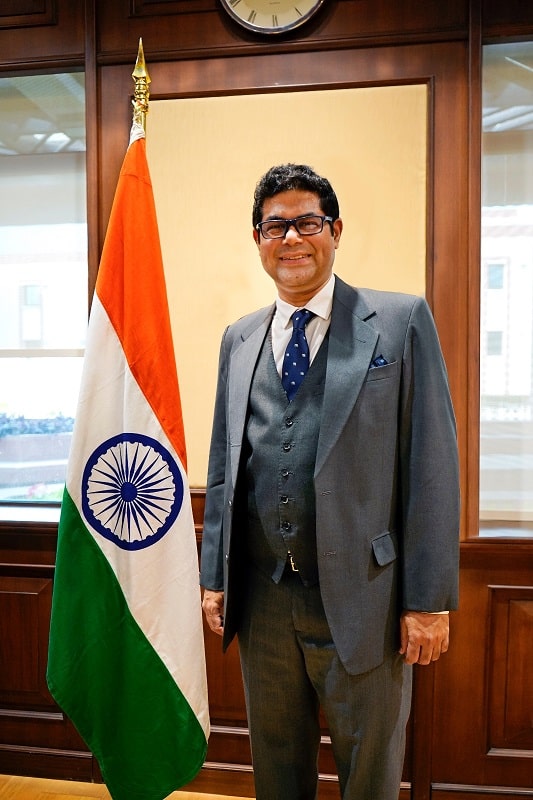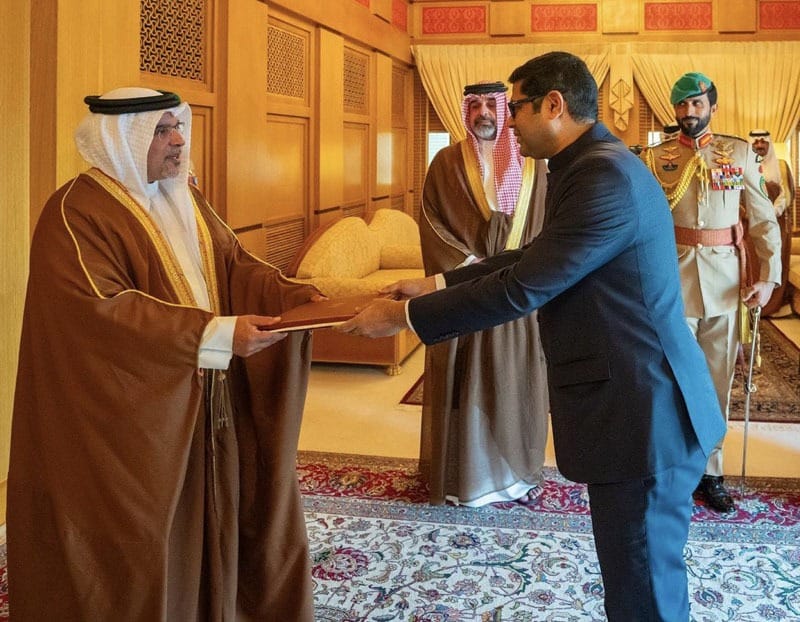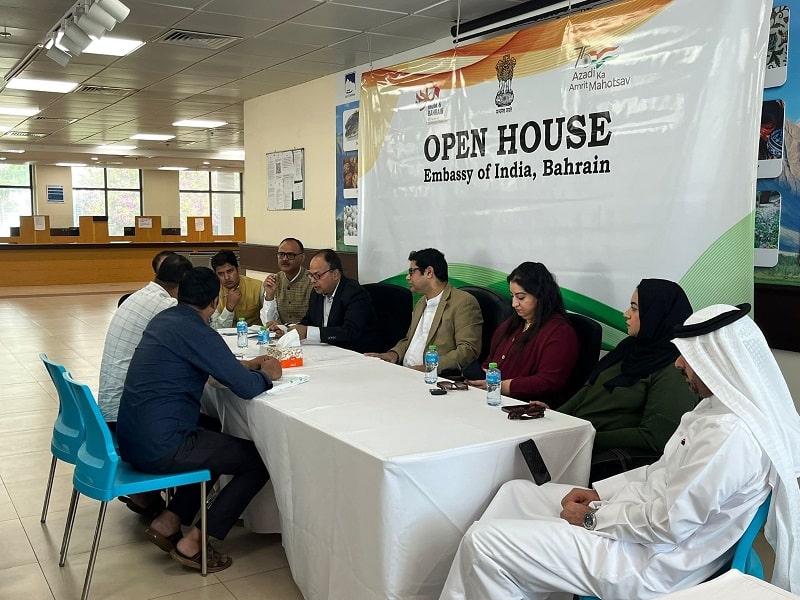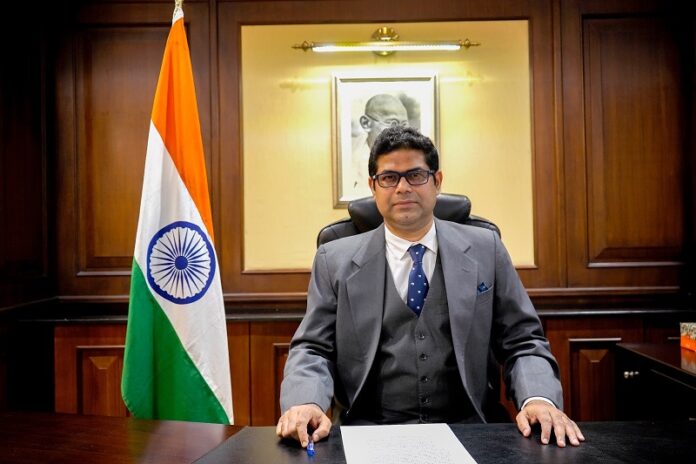Bahrain’s strategic positioning pivotal for further engagement in the region – Indian Ambassador Vinod K Jacob
By Raji Unnikrishnan
India and Bahrain share a “civilisational bond,” which has the potential to scale further in the future with the nations’ leaders looking at bilateral relations through the same prism, observed the Indian Ambassador to Bahrain, Vinod K Jacob.

In an exclusive interview with Bahrain This Week, on the solemn occasion of the 75th Indian Republic Day, the envoy expressed optimism for a brighter future, emphasising the potential for growth and collaboration and highlighting India’s evolving landscape and the vast opportunities it presents for the region.
The ambassador lauded Bahrain’s deep understanding of India as a reliable partner, fostering a relationship built on confidence and purpose. As both nations navigate new challenges, the strategic positioning of Bahrain is seen as pivotal for further engagement in the region, reflecting a shared vision for elevated bilateral relations, he cited.
“The Indo-Bahrain relationship is strong and robust and is based on fundamental consensus between the leadership of both sides,” said Mr Jacob.

Ambassador Mr. Jacob presenting his credentials to Deputy
King of Bahrain, His Royal Highness Prince Salman bin Hamad Al Khalifa
“It was articulated in the state visit of Prime Minister Narendra Modi in August 2019, where they reiterated the fundamental basis of the engagement, which is the long-standing historic ties, civilisational values, common interests, and the commitment to taking the relationship forward. The aim is to engage and strengthen this relationship across political, economic, trade, commerce, culture, people-to-peopl, defence, higher education, science, and technology—all areas—and also new frontiers in their areas like renewable energy, information technology, ideas, etc.”
Mr Jacob pointed out the prominence of Bahrain as a ‘connect’ between the Gulf and the Indian subcontinent.
“There is something significant about this bilateral relationship, quite unique in this region if you look at it, which is that this is a civilizational relationship. Bahrain used to be the place from where different people in parts of history came to the Indian subcontinent, and from there they went to different places like Sri Lanka, Southeast Asia, etc. So Bahrain is the direct connect between the Gulf and the Indian subcontinent. The leadership in Bahrain has, through the Al Khalifah dynasty for more than 200 years, consistently encouraged good cooperation with India, irrespective of who was in power or authority in Delhi.”
He appreciated the excellent leadership on the Bahraini side, acknowledging His Majesty King Hamad bin Isa Al Khalifa and the Prime Minister and Crown Prince His Royal Highness Prince Salman bin Hamad Al Khalifa, for accepting India as a partner they can work with “a sense of confidence, with a sense of purpose.”
“They realise that India offers an excellent growth story,” he added.
On the flipside, he noted that on the Indian side, there is a rediscovery of the relationship.
“They see that with this region growing and prospering, taking on new challenges, and dealing with it in a very sophisticated way, Bahrain is ideally located strategically for further engagement in this region. I’m pretty encouraged by the fact that the leaders on both sides look at the bilateral relationship through the same prism.”
As the world witnesses important changes, the degree of convergence among the nations is higher, cited the envoy.
“Be it the challenge of cross-border violence or terrorism, be it the transnational issues of climate change, etc., there is a high degree of convergence between India and Bahrain, which gives further encouragement to someone like me and my counterpart in New Delhi to say that, you know, there’s a whole world out there to further explore to take it to the next level.”
Mr Jacob, who assumed office on August 4 last year, stated that his role as an envoy was to convert the consensus that the leadership has reached into reality and to take the relationship to the next level.
“And I intend to do it by promoting and protecting Indian interests, promoting and protecting the interests of Indian citizens and Indian nationals here, supporting them in their consular responsibilities and activities, and also negotiating the relevant agreements for taking the relationship forward.”

A monthly open house at the Indian Embassy
Cultural ties and people-to-people connections are crucial in strengthening bilateral ties, said the diplomat, who acknowledged the success of the first India in Bahrain Festival hosted by the mission earlier this month. The success, he said, “is a manifestation of the deep-rooted cultural and civilisation lies between India and Bahrain, which is more than 4000 years old.”
“When you talk about culture and people to people, there are two aspects: the past as well as the present. Now, in terms of the past, we have a great past. So there’s a lot of elements that we can pick up on, and that is the aim of these festivals and outreach activities. In the present are the things that we have to do to lay the basis for the future.”
Mr Jacob said the mission aims to push for activities of the Indian Council for Cultural Relations (ICCR) in Bahrain and to support activities of Indian community organisations that want to promote Indian culture in the country with the help of the local authorities, among others. The embassy has initiated a programme for Bahraini journalists to visit India as well as the Visit Embassy Programme to encourage the youth in Bahrain, both Indians and Bahrainis, to understand and appreciate the bilateral relationship.
“Also to understand the new India, which offers huge opportunities for growth for the region as well as for the world,” explained the ambassador.
Bahrain is home to 340,000 Indians (as of October 2023), whom the envoy described as “good guests” to an “excellent host”. Mr Jacob who underscored the importance of the Indian diaspora for the bilateral relationship, testified of the support he has enjoyed from the community in the almost six months that he has been in the kingdom.
“I take this opportunity provided by your platform to convey to the Indian community my sincere appreciation for all the support they’ve given. I’ve seen that in the various open houses that have been held once a month, but also when I look at the overall picture of the diaspora in Bahrain, I split it into parts: rules as well as responsibility. When we look at the rules, I would say that in the way in which they have conducted themselves, in the way in which they have contributed to the economic prosperity of Bahrain, and in the way in which they have acted as a bridge between the two societies, they have done an exemplary job. While doing that, they have carried out what are essential requirements in any ordered society, which is that they followed the laws and rules of Bahrain. I’m very happy to stay that overall the Indian community has lived as good guests to an excellent host, which is the leadership and the government of the people, and it is my hope that during my tenure the cooperation between the two societies will be strengthened as a result of the positive contribution of the Indian diaspora.”
The diplomat reflected on the ceremonious occasion of Republic Day, on which the country celebrates the adoption of its Constitution in 1950 and its relevance in contemporary times. The embassy hosted a flag hoisting ceremony at its Seef premises on January 26, which was attended by community members.
Mr Jacob observed that the day was an opportunity to recall the sacrifices of freedom fighters, the contribution of the drafters of the Constitution, the role of the Indian armed forces, and that of Indians living all around the world.
“While also doing that, we also remember the challenges and suffering of compatriots in India and abroad and try to work together with a sense of purpose with local governments, host governments, etc. to elevate those challenges and sufferings.”

